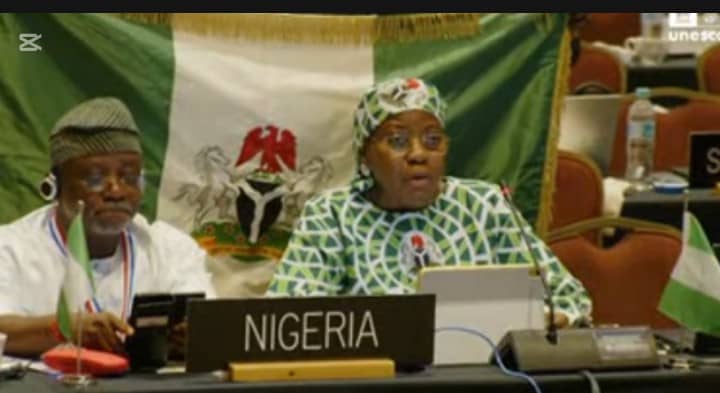
The United Nations Educational, Scientific and Cultural Organization (UNESCO) has inscribed Kano Durbar on its Representative List of Intangible Cultural Heritage of Humanity.
The nomination of Kano Durbar, a religious and cultural festival that unifies the people and Nigeria’s most spectacular and biggest horse parade was adopted at the ongoing 19th Session of UNESCO’s Intergovernmental Committee for the Safeguarding of the Intangible Cultural Heritage in Ascunsion, Republic of Paraguay, making it the 8th element to be inscribed on the Representative List from Nigeria.
Recall, 9japarrot reports on June 16, 2024 that the Executive Secretary/CEO of the National Institute for Cultural Orientation (NICO), Otunba Biodun Ajiboye has pushed for the inscription of Kano Durbar on the Representative List of Intangible Cultural Heritage of Humanity at the Intergovernmental meeting scheduled to take place later this year in Paraguay.
According to him, the move to further push for the inscription of Kano Durbar came at the 10th Session of the General Assembly of the States Parties to the Convention for the Safeguarding of Intangible Cultural Heritage which held at the UNESCO headquarters in Paris, France from June 11 to 12, 2024.
The Executive Secretary/CEO of the National Institute for Cultural Orientation (NICO), Otunba Biodun Ajiboye while breaking the news of the inscription of Kano Durbar in a statement issued to the media through his Media Assistant, Caleb Nor expressed heartfelt appreciation to the Evaluation Body for approving the element.
His words On behalf of the President and Commander-in-Chief of the Armed Forces, Federal Republic of Nigeria, His Excellency, Bola Ahmed Tinubu; the Honourable Minister of Arts, Culture, Tourism, and the Creative Economy and the entire people of Nigeria, I say thank u for this immense recognition of a culture that serves not only the people of Kano but the entire northern Nigeria.
This feat gives us immense pride as a country. This element represents the veritable bond between the kingship, leadership and the people of Kano. lt is more of a social contract that binds the individual community to each other in a way that fosters social cohesion. lt is driven by collective purpose and creative ingenuity and a sense of communal dedication and commitment to centuries old cultural patrimony. This element is at the very core of our sustainable development as a people, he said.
Also appreciating the Committee for the unanimous decision to inscribe the Kano Durbar as Intangible Cultural Heritage of Humanity, the Ambassador and Permanent Delegate of Nigeria to UNESCO, Her Excellency, Dr. Hajo Sani said the inscription is yet another testimony of harmony in the common belief of member states in culture and tradition as central to human development and the linkage of historical patterns and contemporary practices through living heritages around the world.
According to her, Kano Durbar is one of such traditions that celebrate leadership, elegance and the power of cooperation between communities and ethnicities which its inscription on the Representative List of the Intangible Cultural Heritage of Humanity will contribute to the visibility of the intangible cultural heritage of the people in general and raise awareness of its importance at the local level.
Since 1466, the Kano Durbar is held as a procession of 10,000 men on horses, as well as men and women on foot performing various actions transmitted through generations. It is held ordinarily during the two Muslim Festivals of Eid El-Fitr and Eid El-Kabir in the ninth month and the twelfth month of the Muslim calendar respectively every year, and on other special occasions.
The Durbar is a festival of colour, respect, pride and harmony. It is a powerful socio-cultural festival that brings together many ethnic groups including Hausa, Fulani, Arabs, Nupe, Yoruba and Tauregs – thus, integrating them into one community with dominant Hausa-Muslim culture. The special products of the various ethnic groups are incorporated in the Durbar over the centuries, constituting an industry that creates jobs and economic empowerment within the communities.
Given its unique and uniting elements, the Durbar has grown to become popular to the point that many states across northern Nigeria now practice it, including the Federal Capital Territory during the Abuja Carnival. This inscription is also an opportunity to expose to all UNESCO Members States, the creative content of one of the best equestrian heritages in terms of apparels, properties and skills deployed by the bearer and the practitioners”.
“We are happy and grateful, once again, for this inscription. It also brings us pride and we are determined to continue to take solid safeguarding measures to preserve this great intangible heritage of humanity for future generations”.
Others who are part of the Nigerian Delegation are Mr. Augustus Babajide Ajibola, a consultant to NICO and Dr. Remi Olajide who is Adviser to the Ambassador and Permanent Delegate of Nigeria to UNESCO.

